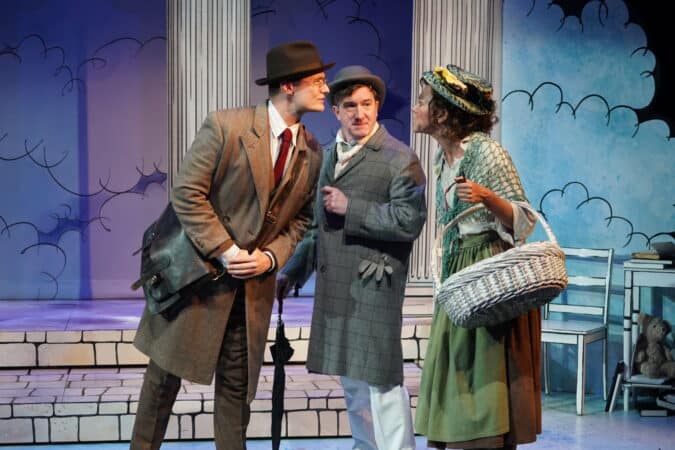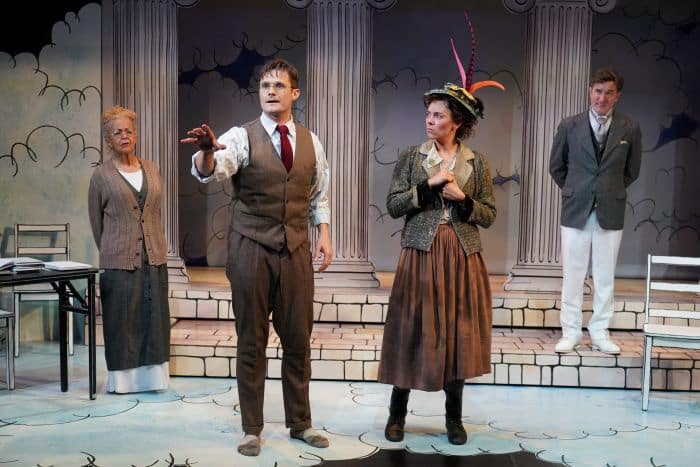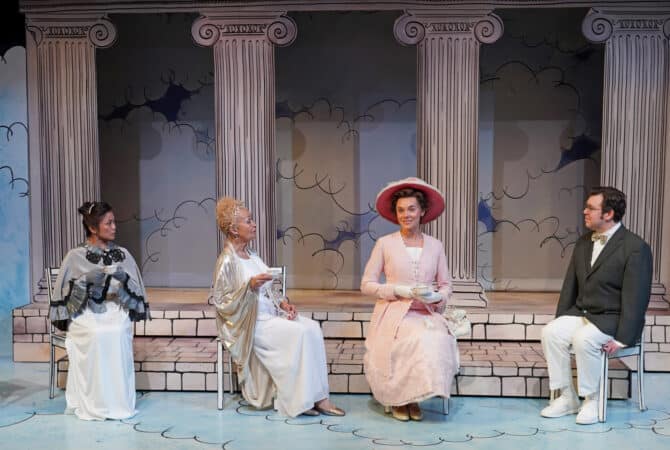The latest production in Gingold Theatrical Group’s signature dedication to the canon of Irish playwright George Bernard Shaw is Pygmalion, adapted and directed by the company’s founding artistic director and leading Shaw expert David Staller. One of Shaw’s most popular plays – written in 1912, debuted in Vienna in 1913, and inspired by the ancient Greek myth of the eponymous figure, who, alone and disenchanted with the faults of people, fell in love with the sculpture of a beautiful woman he created and whose wish that she would come to life was granted by Aphrodite – takes the themes of transformation, love, and identity, and resets them in early 20th-century London, where phonetics professor Henry Higgins makes a bet with linguist Colonel Pickering, who has a mutual interest in the sound and structure of language and a respect for Higgins’ work, that he could pass off Cockney flower girl Eliza Doolittle as a duchess by instructing her for six months on how to speak properly.

While most fans are familiar with My Fair Lady, Shaw’s own 1938 screen adaptation of the play, on which the 1956 musical stage version was based, Staller returns to the script of the original pre-WWI comedy of manners combined with Shaw’s expressed intent in the notes of his drafts for the Oscar-winning movie, to frame it in the device (rejected by the film’s producers) of Greek goddesses looking down from the clouds, recounting the ancient myth, how it relates to the story of Henry Higgins, and explaining that it serves as a reminder not to hide or to distance oneself from life and love. It all takes place on a stationary set inspired by the drawings of artist Al Hirschfeld, a longtime friend of Staller, who shared a passion for Shaw, captured images of the playwright and his work over many years, and had hoped to design a production of Pygmalion – a wish that never came to fruition during his lifetime but is now represented in Gingold’s delightful set (by Lindsay Genevieve Fuori, as if drawn by the late artist, in partnership with the Al Hirschfeld Foundation) of an ancient temple with a backdrop of clouds and a winged portrait of Shaw behind the pediment, overseeing the action below.
Under the fluid direction of Staller, the scenes move back and forth between the two goddesses and two gods, enhanced with shifts in lighting (by Jamie Roderick) and the sound of thunder (by Julian Evans), directly addressing the audience, introducing the mythological tale and its message, and noting that they laugh at people – a lot! – thereby setting the cheeky tone of the show, and enactments of the fortuitous encounter of Higgins, Pickering, and Eliza, the resulting instructions to improve her speech and demeanor (here cleverly done through a fast-paced segment of voiceovers by the actors, while miming their proper talking, walking, sitting, and dancing over the initial three months), her introduction to Higgins’ well-bred mother and her friends, with stiff adherence to what she was taught, then unexpected “new small talk” about her actual family background, reversion to her native Cockney slang, and inappropriate expletive, and three months later, her more polished appearance at a formal garden party, at which it became clear that Higgins won his bet, and after which the questions arises: Now what?

A thoroughly engaging six-person cast, four playing multiple roles of both deities and humans, masterfully delivers the distinctive personalities and social classes, contrasting accents and demeanors, witty observations about human nature, the stressful constraints of society’s strictures (including the then shocking use of the word “bloody,” which, a divinity tells us, nearly resulted in the early censorship of the play), and Shaw’s feminist characterization of strong and discerning women with their own thoughts and feelings, despite the directives of the men. Each and every performance is a standout, yet completely in tune with the others and the pitch of Staller’s perfectly honed vision.
Synnøve Karlsen stars as the poor and underprivileged Eliza, with a spot-on Cockney accent and a feisty attitude, who soon metamorphoses into the lady Higgins molded, with hilarious comic timing in her slip-ups, explosive anger and profound pain at being cast aside by him, without a word of acknowledgment or praise for her, after accomplishing what he set out to do, and assertive self-assurance in deciding for herself what her future will hold, leaving us wondering if it will be with or without her mentor, not wanting his love but his respect and caring. Mark Evans embodies the problematic and hypocritical Higgins, who, though of a more prosperous descent and professionally knowledgeable about how to be well-spoken, is lacking in self-awareness and social decorum, prone to cursing and behaving improperly (e.g., sitting backwards on a chair with legs spread wide in front of guests at his mother’s tea time), losing his temper and hurling hurtful insults at Eliza (famously calling her “a squashed cabbage leaf”), generally lacking in empathy and sensitivity, and seeing her merely as one of his intellectual accomplishments, not as a human being. Will he in turn learn from her, as the gods intend? And in his role as Colonel Pickering, Carson Elrod (who also appears as one of the gods) is a kinder, more considerate, and more gentlemanly patron to Eliza and counterpoint to Higgins, who, though not without an occasional error (he, too, neglects to congratulate her on her accomplishment, not just the men’s), and inspires her self-worth by calling her “Miss Doolittle,” for which she expresses her recognition and gratitude.

Rounding out the outstanding (and brilliantly directed) cast are Teresa Avia Lim, Lizan Mitchell, and Matt Wolpe as the deities (along with Elrod), who provide the context of the story and lessons to be learned with godly knowledge and humorous barbs at human behavior. Each also portrays two of the supporting characters, clearly distinguishing their personalities and bearings, and bringing the laughs: Lim as Clara Eynsford-Hill, the friend of Higgins’ mother, who enjoys and emulates Eliza’s aforementioned “new small talk,” and later as the modest and dutiful maid Mary; Wolpe as Clara’s brother Freddy, who is smitten with Eliza and hopes for a relationship with her, and as Alfred Doolittle, Eliza’s father, who represents a member of the “undeserving poor” and a low-class haggler, selling his daughter to Higgins for five pounds, until a surprise inheritance, triggered by a letter from the professor to his unknown benefactor, changes him into an over-dressed lecturer on moral reform, who is “ruined” by the anxiety and pressure caused by middle-class expectations of respectability and appearance; and the uproarious powerhouse Mitchell, doubling in her mortal roles as Higgins’ housekeeper Mrs. Pearce, who cleans and dresses and watches out for Eliza, and Mrs. Higgins, Henry’s discerning mother who sees his flaws and addresses them, and takes in Eliza after she leaves his house, recognizing her worth and emergence as an independent woman. The performances are enhanced by character- and class-defining costumes (by Tracy Christensen) and telling props (by Seth Tyler Black).
Whether you’re a longtime afficionado of Shaw’s socially insightful and comically critical work or are experiencing his masterpiece Pygmalion for the first time, Gingold’s stellar production is a must-see for its authentic adherence to the intentions of the playwright, its superb direction and performances, and its unique design, paying homage to a famed artist who was one of Shaw’s biggest fans. Don’t miss it.
Running Time: Approximately two hours, including an intermission.

Pygmalion plays through Saturday, November 22, 2025, at Gingold Theatrical Group, performing at Theatre Row, Theatre 5, 410 W 42nd Street, NYC. For tickets (priced at $36.50-92.50, including fees), go online.



